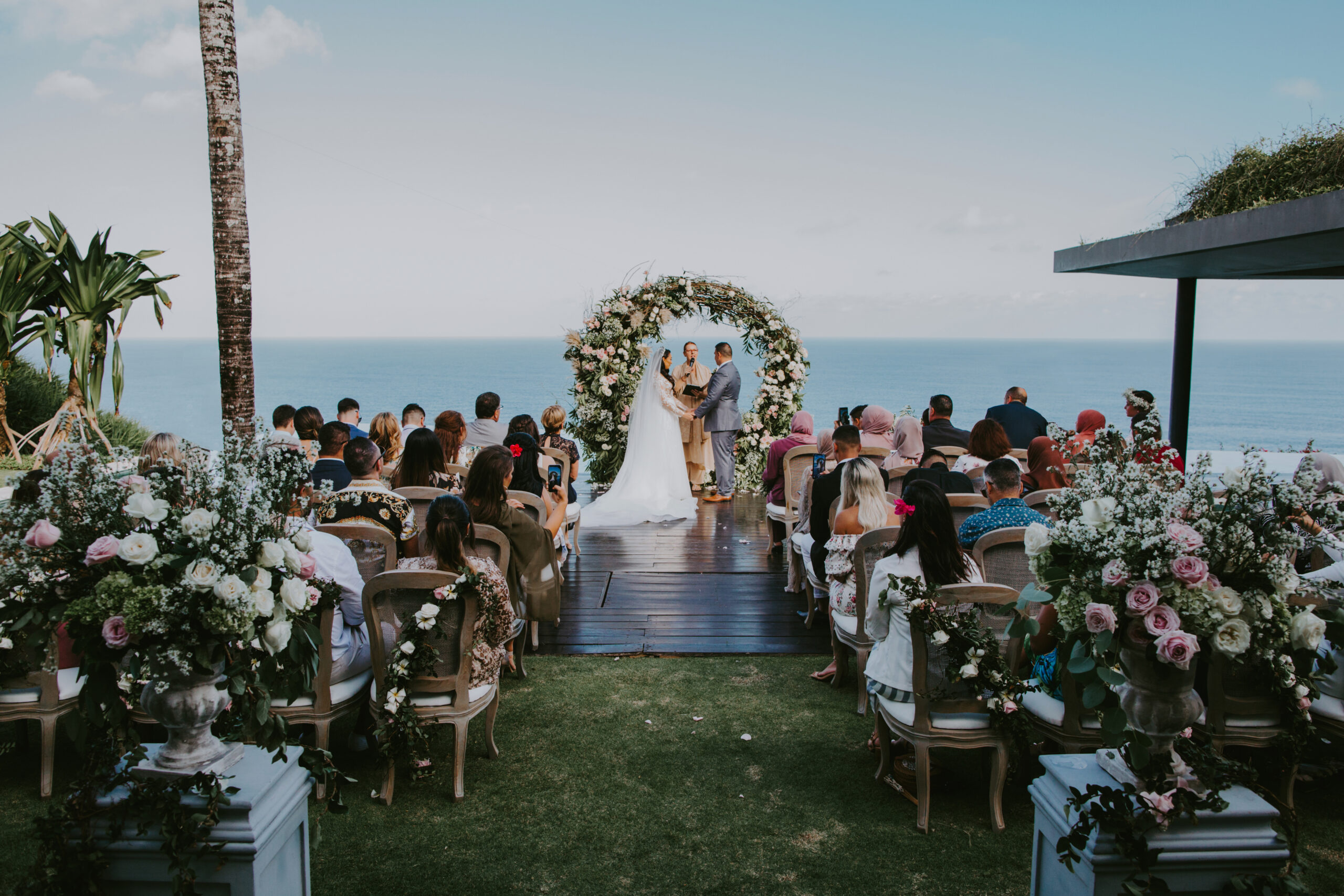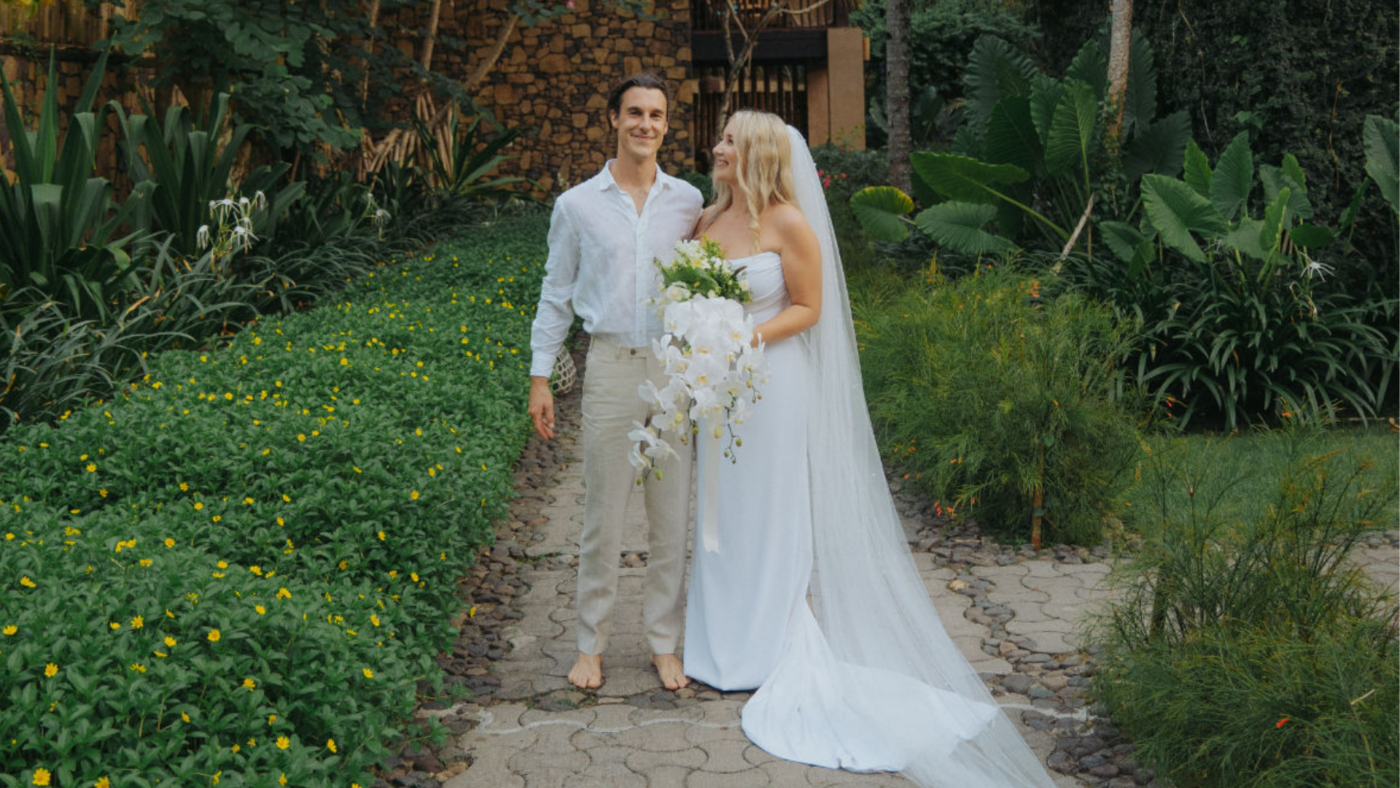 How do you get legally married in Italy for a destination wedding?
How do you get legally married in Italy for a destination wedding?
How do you get legally married in Bali for a destination wedding?

One of the most popular locations for Australians getting married overseas is Bali. It’s easy to understand why: lush tropical rainforests, iconic rice fields, and perfect weather are just some of the reasons couples love this destination. For those wanting to get legally married in Bali, it’s a stunning destination that brings your closest friends and family together for multiple days of beach lounging and celebration.

Bali Wedding // Credit to APEL Photography
Before heading off to marital bliss, you’ll want to consider whether to have your legally binding ceremony in Bali or back home in Australia. We generally recommend sticking close to home for the legal stuff, but let us explain.
Indonesia is a very religious country with a largely Muslim population. For Australians looking to marry here, things can get complicated due to the country’s requirements that wedding ceremonies are both religious and legal. Not to worry, though, we’ll happily talk you through the marriage requirements so you can decide what will work best for you and your partner.
Understanding Indonesian marriage requirements
As an Australian couple, you’ll need to comply with both Indonesian law and Australian law to ensure your marriage is recognised.
Indonesia has fairly strict religious rules in place when it comes to legally marrying, not the least of which is that you must identify as Buddhist, Catholic, Hindu, Islam, or Protestant in order to have a legally recognised marriage under Indonesian law. And your ceremony must be performed by a religious minister or civil registrar.
Legal requirements for marriage in Bali
To legally marry in Bali, you must meet Indonesian legal requirements, which include:
-
Same religion: Indonesian law requires both parties to be of the same religion. If you’re not, one partner must officially convert.
-
Recognised religions: Only five religions are officially recognised — Islam, Hinduism, Buddhism, Protestant Christianity, and Catholicism.
-
Valid passports
-
Birth certificates
-
Certificate of No Impediment to Marriage (CNI) – more on this later
The workaround that we typically recommend is to first marry legally in Australia before heading overseas. It doesn’t need to be anything grand – save the big impression for Bali! Simply have your legal ceremony at your local registry office and then it’s on to planning your symbolic and ceremonial Balinese dream wedding with the legal stuff out of the way before you arrive.
By following this path, you’ll avoid any red tape around legally marrying in Bali, not to mention streamlining your planning process significantly. You don’t even have to tell guests if you don’t want to — a lot of couples keep it a secret to ensure the focus remains on the romance and emotion of the wedding day.

Emma and Tanna’s destination wedding in Bali | Venue: Jeeva Klui Resort
Getting legally married in Bali: what you’ll need
If you decide to move forward with the legal wedding ceremony in Bali, here’s what you’ll need:
Before you leave Australia:
- Check religion requirements
- Gather documents: Passports, birth certificates, any divorce or death certificates
- Book CNI appointment with the Australian Consulate in Bali
In Bali:
- Attend CNI appointment
- Provide copies of all documents to your wedding planner or celebrant
- Hold a religious ceremony and a civil ceremony
- Register marriage with the Indonesian Civil Registry
- Receive a Marriage Certificate (Akta Perkawinan)
Certificate of No Impediment (CNI)
You can get a Certificate of No Impediment from the Australian embassy or consulate. This document certifies that you’re free to marry, and it’s one of the key documents you’ll need to marry in Indonesia. In order to get it, you’ll need your original passports, birth certificates, divorce or death certificate of previous spouse if applicable, evidence of name change if applicable, and four passport-sized photos of you both. Your documentation must all be translated into Indonesian.
Notice of Intention to Marry
Once you arrive in Indonesia, you’ll need to file a Notice of Intention to Marry. You can do this at the local Civil Registry Office, and you should do so at least 10 days before your wedding. This document is your formal declaration that yes, you’d like to marry in Bali — and is a prerequisite when gaining your marriage license.
Religious ceremony
Marriages in Bali are conducted according to religious customs — which may be Hindu, Buddhist, Christian, Catholic, or Muslim. Each of these religions has a distinct set of requirements for marriage. This means it’s vital that you check in with local religious authorities, to get a good idea of the procedures and necessary documentation needed to marry. Keep in mind that Indonesian law also requires both parties to be of the same religion, or for one party to convert to the other religion.
Two witnesses
You’ll need two witnesses at your wedding ceremony with up-to-date passports as identification.
Professional assistance
Most couples who go this route will end up using a local celebrant or agent to help with the process. Some resorts offer this service to alleviate some of the stress for couples and help with basic translations along the way.
Timelines & deadlines to remember
- CNI appointment: Book 1–2 months in advance
- Document gathering: Begin at least 8 weeks before your wedding
- In-Bali paperwork: Allow at least 3–5 working days for appointments and processing
- Marriage certificate translation: Can take up to 1 week.
Weigh the pros and cons of getting legally married in Bali
While being a little more complex to legally marry in Bali than in your home country, it is achievable once you understand the country’s religious rules and requirements. As long as your wedding meets Australian standards, it will also be recognised in Australia.
On the other hand, choosing to marry at home in Australia will save time and stress when those two things are paramount. You can still celebrate your civil ceremony in Bali, it just won’t be the legal signing of documentation, as you’ll do this step back home.
Weigh the pros and cons as a couple and speak with your families about what’s most important to you. We’re happy to help you navigate this decision and so many others while you plan your destination wedding in Bali.

Amelia and Michael’s Bali Beach Glamping wedding, captured by Motion House Creative
If a legal wedding in Bali is important to you, plan ahead, understand the process, and double-check everything with your wedding planner or celebrant. But if you’re more about the celebration than the paperwork, a symbolic ceremony can offer all the romance — without the red tape.
Want help planning your dream Bali wedding? Read our full guide on how to plan a Bali wedding and find out the best time of year to get married in Bali.
Considering a destination wedding? Our destination wedding and travel team can help.
Access our free wedding planning PDF by sharing your email.
Disclaimer
We’ve done our best to keep this accurate, but things change. Check with your embassy and revisit Indonesia’s legal requirements regularly.

 What part of Italy is best for a destination wedding?
What part of Italy is best for a destination wedding?  What’s the best time of year for an Italy wedding?
What’s the best time of year for an Italy wedding?